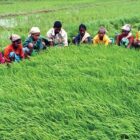The pandemic has deepened the farm crisis and the stimulus pales into insignificance when compared to inexorable disenfranchisement of the farmer.
April is upon us; the Indian summer will soon sear the land and the wheat harvesting will commence in full measure in Punjab and Haryana. It has already begun in other parts of the country. Wheat is procured under the central government’s MSP programme and the onus lies with the government to assuage the unease of the states and the farmers that harvest will begin on time, procurement will happen, stocks will be lifted and payments received as in the years past.
A delay in harvesting or lifting of food stocks in the mandi amplifies the farmer’s risk of the produce getting damaged due to anticipated unseasonal rains. If the process is delayed, the government must assure farmers that it will, if required, compensate and extend the wheat procurement season. Matters are complicated because of the pandemic and closure of markets.
The farmer’s anxiety increases as cereals, fruit and vegetables are ready for harvest across the county. The poultry industry is just as severely hit given the roadblocks to transportation to functioning mandis to reach consumers. The lockdown has disrupted the supply chain. Allowing movement of tractors and labour between villages will ensure that harvesting is not impacted and supply chains can resume.
Standard operating procedures for continuity of supply chains and farm operations in a National Disaster Management Authority framework are missing for ground level administrators to fall back upon. This has been more than evident over the past two days. Multiple notifications by the centre and the state add to the confusion and will continue to do so throughout the lockdown, as had happened previously with a botched GST rollout.
Lack of clarity within the establishment worsened by the lack of credible communication by the central and state governments are making farmers anxious about farm operations. A hue and cry by farmers led to seeds and pesticide sales being added to the list of essential commodities and rightly so. Hopefully, other issues too will be resolved slowly though the recently notified changes do not reflect the ground realities, even as farmers continue to suffer.
A black swan event like coronavirus, could not have come at a worse time for India, where the economy was already decelerating. Understandably, India’s arsenal to respond economically stood depleted because of past policies and the present relief package suffers from inadequacies of depth and direction that are expected from democratically-elected representatives.
It is important to understand the stimulus contextually. Every farmer pays a tax on diesel consumption of up to Rs 2,300 per acre depending on their practice. Over the past six years, the total tax collection on account of diesel consumption by farmers for agricultural use has been about Rs 100,000 crores. The Rs 1.70 lakh crore stimulus is to be seen in this context.
It will be clear that the amount is not as large as it appears to be but, possibly, half the size of the announced figure. Even though the price of crude has halved since October 2019, the common man is paying an extra Rs 35 per LPG cylinder. Consumers are being forced to pay higher prices for essential commodities, as profiteers begin to cash in on the supply chain disruption. This negates the benefits of cash transfers or free gas cylinders to BPL families.
The average annual days of employment provided per household under the MGNREGA is about 45 and not 100 as claimed. Punjab gives Rs 240 per day wages under MGNREGA and more than half the states are committed to giving more than the hiked wages of Rs 202. Further, due to the lockdown, work under the scheme has come to a standstill everywhere. Thus the Rs 20 increase in MNREGA wages is an eyewash. Instead of assuring availability of 100 days of work on demand under MNREGA and saying that farmers will receive the promised MSP for once, the bureaucracy hoodwinked the union cabinet to get assurances of timely release of its own salaries. Ideally, the government should have credited 30 days of advance wages to all those who have availed of the MGNREGA last year, to be adjusted over work done in the coming six months.
Unprecedented circumstances require bold and swift decisions. The announcement under the PM Kisan scheme is only about releasing outstanding dues. The government should double the PM Kisan payments to Rs12,000 annually for this year. Distribution of grains to 800 million people is commendable but it will remain a mystery why it was not announced and distributed in February when the crisis was on the horizon, the Food Corporation storages were overflowing and there was no space to store the new crop due in April.
Transferring three monthly instalments of Rs 500 each to 200 million women in Jan Dhan accounts is good targeting of resources but amounts to less than two days of minimum wages per month. Providing Rs 2,000 to 30 million senior citizens and socially marginalised sections is, however, a compassionate step. More is needed and the RBI ought to create money and directly provide people with purchasing power. It should announce a waiver of interest on farm loans and rescheduling of loan payments. The hope is that the government will quickly transfer money to the beneficiaries by overcoming red tape for this is not time to fear errors of inclusion but seriously worry about errors of exclusion. Farmers have wholeheartedly voted for the PM twice. It is time that he reciprocated the feelings and returned the favour.




